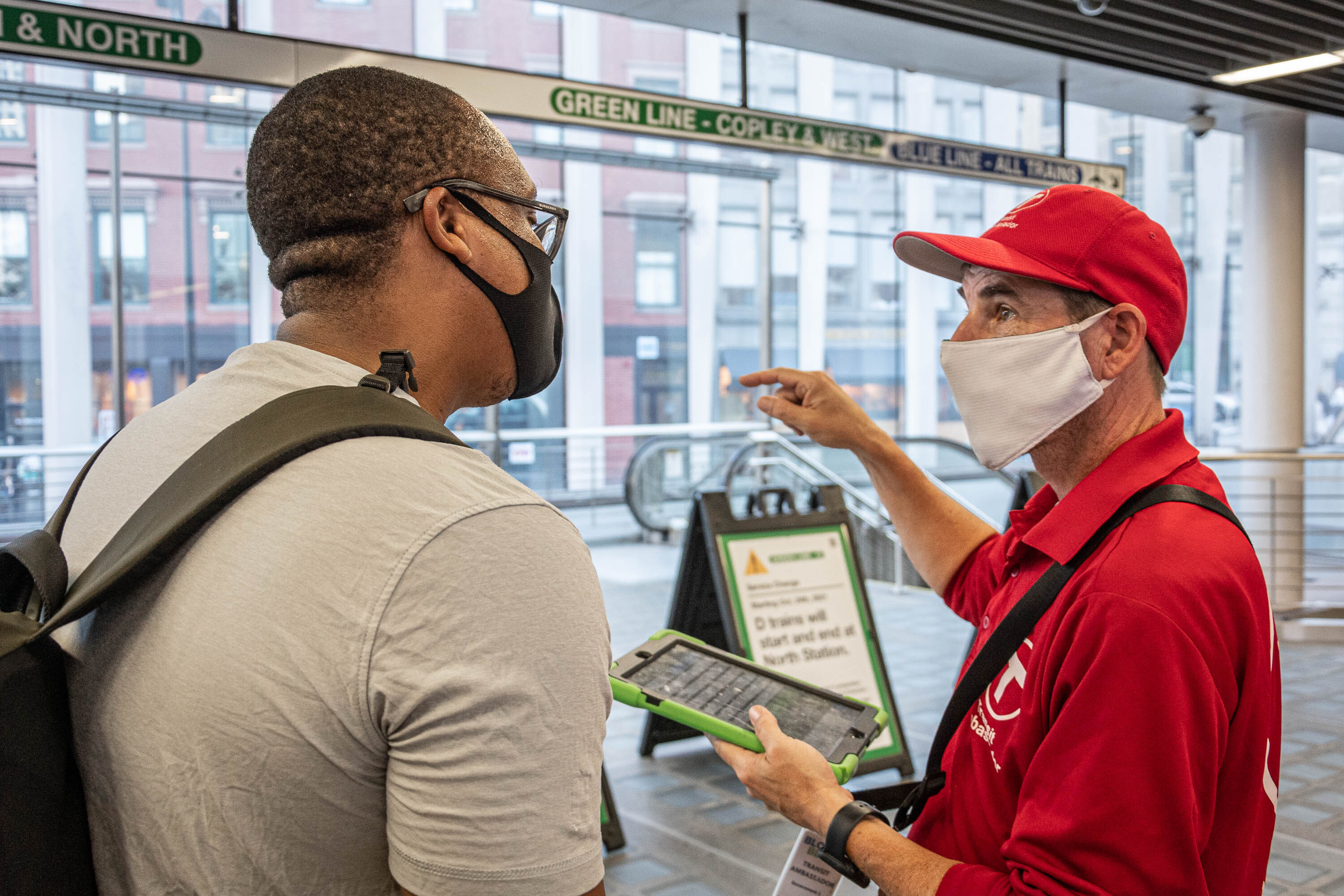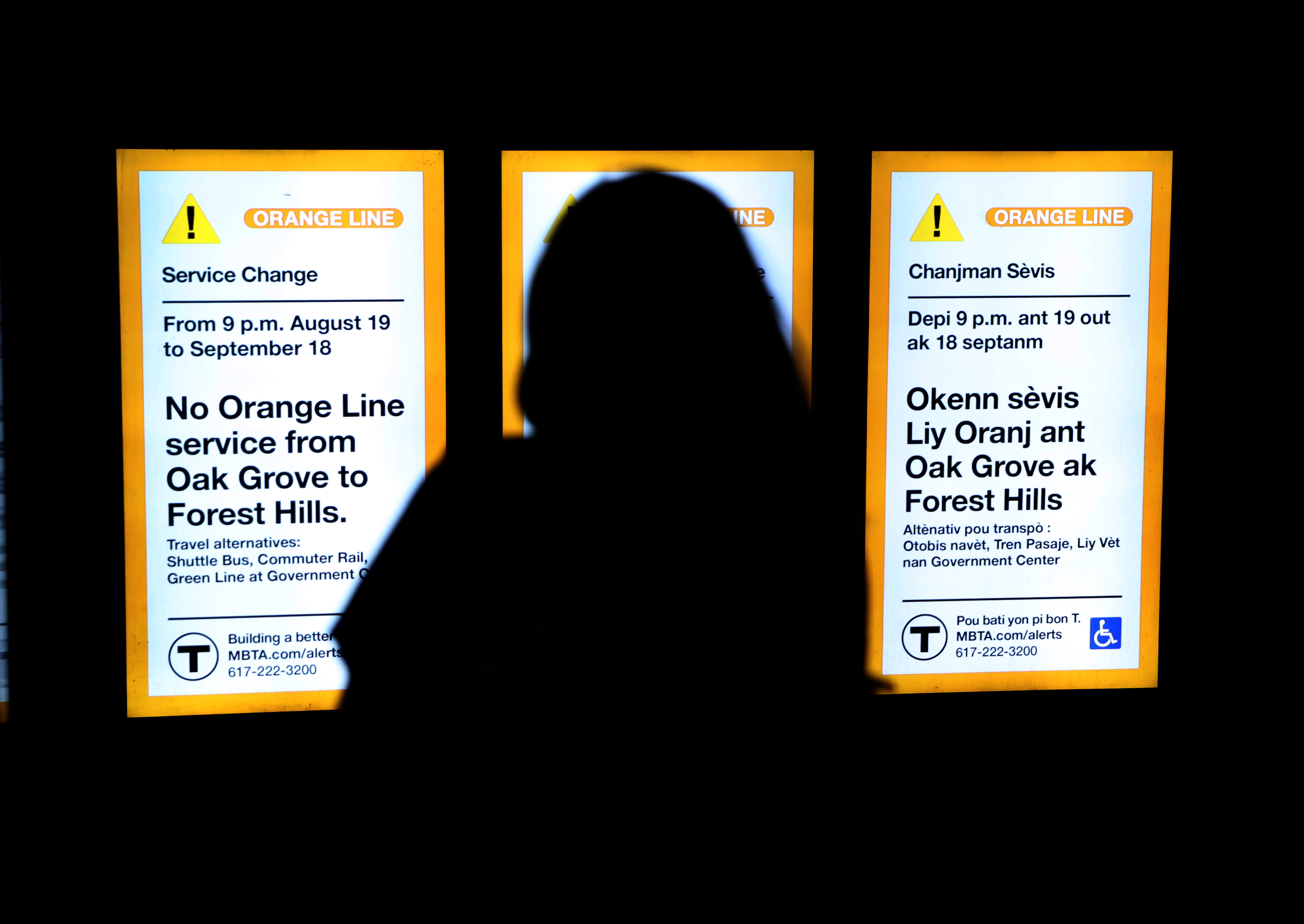What to Know
- Work on the "Orange Line super surge" is on schedule so far, according to MBTA General Manager Steve Poftak
- Some commuters found it took at least twice as long to get to work Monday, but others said it felt more or less normal
- Both Boston Mayor Michelle Wu and Massachusetts Gov. Charlie Baker took the T on Monday
Commuters taking any means of transportation around Boston on Monday were braced for increased traffic and slower travel times as both the Orange Line and part of the Green Line were closed.
WATCH ANYTIME FOR FREE
>Stream NBC10 Boston news for free, 24/7, wherever you are. |
But major problems hadn't materialized before the evening commute on the third full day of the shutdown — the first weekday commutes of the weekslong overhauls. Workers had already completed three projects, including eliminating an Orange Line slow zone downtown, and riders seemed to be flowing on and off the scores of shuttle buses on area streets, according to MBTA General Manager Steve Poftak.
"This is really the first Monday, the first weekday for the T to gauge how our alternative service plans are serving riders," said Poftak. "And I would say we are cautiously optimistic that things are going relatively smoothly."
Get updates on what's happening in Boston to your inbox. Sign up for our >News Headlines newsletter.
Riders around Boston reported varied impacts to their commutes. Some were finding it took at least twice as long to get to work, requiring several transfers, but others said it felt more or less normal. But Monday may not be representative of commutes during the shutdown.
Massachusetts Department of Transportation Highway Administrator Jonathan Gulliver told NBC10 Boston that Monday may not be the best judge of how things are going, given that Mondays have been a little different the past couple of years of working from home, and that Tuesday and Wednesday could be the real test.
Poftak agreed, and reiterated officials' prior request that anyone who can avoid heading downtown do so.
Poftak is urging drivers to stay off the roads as much as possible.
"I'm hopeful there's not more people out on the roads tomorrow, but I also don't want the message from today to be, 'OK, things went relatively well, I guess it's OK to drive to work tomorrow," he said.
Work Getting Underway
The Orange Line shut down for its monthlong repairs Friday night. the MBTA has said the work will improve travel times between stations and service reliability for the more than 100,000 people who take it daily.
The northern part of the Green Line shut down starting Monday as well, from Union Square to Government Center.
Many in and around the city opted to use the shuttle replacement service, Commuter Rail or even free BlueBikes to get around.
Poftak shared updates on how much work has been done so far, with 2,400 feet of rail replaced on the Orange Line, including between Downtown Crossing and State Street, which eliminates one of six slow zones. Signals are being worked on at Oak Grove and Malden Center; roof work is being done at Sullivan Square and Wellington stations; electricians are working on the lighting at Forest Hills, Mass. Ave, Stony Brook and Assembly.
"We have an active work zone up and down the Orange Line and we are taking full advantage of this 30 days of unencumbered access … to get lots of important work done," Poftak said.
Above ground, he only knew of one accident involving a shuttle bus, a sideswiping collision with a truck near Wellington Circle that resulted in no injuries. Overall, there were 100-110 shuttles running between Oak Grove and Government Center, the north shuttle route, and 50-60 running between Copley Square and Forest Hills.
The work on the "Orange Line super surge" is on schedule so far, Poftak said. He still expects the T to finish five years' worth of Orange Line projects in 30 days, he said. Asked what he thinks of riders skeptical it will all be finished on time, he noted that the work schedule was made so that some projects can be "put to the side" if they aren't completed by Sept. 18, but also that, if work ends early, there is more work that can be added to the schedule.
What would push back the project's end date is "a critical safety issue" arising, according to Poftak.
As he left the briefing Poftak was asked how he's sleeping.
"I am sleeping well but I confess I was up at 4 a.m. kind of pondering how today was going to go," he said, "so hopefully I get more sleep tonight."
Boston's Mayor, Massachusetts' Governor Ride the T
Boston Mayor Michelle Wu rode the T to work Monday, posting a picture on social media of herself on the 34 bus to Forest Hills. From there, she took an Orange Line shuttle to the Green Line to City Hall, then held a news conference.
"Overally, I'm very hopeful that it seems like much of the planning and all of the details we have discussed have been implemented, and so far, so good," Wu said. She said there were plenty of shuttles and plenty of T staffers at the stations, but some additional multilingual signage definitely needs to be added.
"We're still tweaking things as we go and updating it day by day," the mayor added. "MBTA riders are always ready for anything. If you are on the system every day you could be prepared for anything to happen, and so I think people are used to having to navigate the complexities, and the goal of this surge period is we will eliminate some of that need to be resilient on a day to day basis as an MBTA rider."
Still, she said the true test of the MBTA diversions will be when school is back in session next month.
On Saturday, Wu rode the MBTA Commuter Rail, encouraging T passengers to take advantage of alternative ways to travel that are being offered during the month-long Orange Line shutdown.
The mayor rode the Commuter Rail after speaking with news outlets at Roslindale Village Station, during the first full day of the Orange Line's temporary closure.
"The Commuter Rail will be one of the best ways to get around while the Orange Line trains aren't running," Wu said to media organizations Saturday afternoon. "I want to make sure everyone across the city knows that it is free for anyone to get on, at a stop within the City of Boston."
All riders need to do for the free service during the shutdown is show a CharlieCard or CharlieTicket to the conductor on the Commuter Rail train. It doesn't even need to be loaded with money. This includes Zones 1A, 1, and 2 on all Commuter Rail lines. The city distributes CharlieCards at Boston Public Libraries through its CharlieCard Access Initiative.
"It is fast, it comes on a regular schedule," Mayor Wu said. "They've increased the frequency being made at each of the stops."
The mayor said historically, she hasn't frequented the Commuter Rail, saying it's "usually so expensive to ride." She called it "probably the best alternative" to getting around quickly during the Orange Line's closure.
Gov. Charlie Baker said on Twitter that he rode the Haverhill Commuter Rail line on Monay morning and everything went smoothly.
"The team and I have been in close contact with the T over the weekend and today to monitor the diversion and construction progress," he said. He also thanked T employees and riders for their hard work and patience.
What Riders Are Saying
NCB10 Boston spoke to a few Commuter Rail riders at Oak Grove station Monday morning who said they opted for that option since there are fewer stops.
Thomas Johnson said it had taken him about 10 minutes longer when he left at 5 a.m. to head to North Station from Fenway.
"Confused," Carol Canlas said. "We don't know which one to take, the bus or the train, but we'll give this a try."
"I'm here a little early," Bob Walsh said. "Figure out what to do."
Hannah Albright budgeted an extra hour to make it from Sullivan Square in Charlestown to her medical appointment at Tufts Medical Center near Chinatown.
"Much better now that it was in the morning," said Albright. "The morning commute was iffy but wasn't as bad as it could have been. I was expecting it to be horrible."
Normally, it would have been a straight shot for her to Tufts. Monday, it took a shuttle to the Green Line and then a walk to make it to the hospital.
But it turns out she only needed an extra half hour, as the shuttle bus arrived quickly and there wasn't a lot of congestion on the roadways, but it was busy as the morning commute got underway.
"Just packed," she said. "And a lot of people not knowing where to go or what to do."
There are information ambassadors out at the stops trying to help people navigate and get them to their destinations.
NBC10 Boston's Matt Fortin was riding Orange Line shuttle buses Monday morning and said he saw several MBTA workers at the stops along the routes. He said they've been very nice and willing to help anyone who was having trouble.
The Commuter Rail isn't the only alternative to Orange Line service that's being offered. Shuttles are also in use along the line during the shutdown, and there are free passes available to use the city's bike sharing service, Bluebikes.
The Boston Cyclists Union held a group practice ride Sunday from Oak Grove Station to Downtown Boston in anticipation of traffic concerns.
"I think it's going to be really congested," said Eden Jundi, who will bike to work. "I feel like we need to work around it. Maybe more bike lanes. Maybe different routes for cars, as well."
"I'm looking forward to just figuring out the route and seeing how safe it is," Nicole Jacob, another person who will bike to work, said.
Some commuters said they used Monday to test a plan for the first time and they'll make adjustments as needed.
"Today is my first day of school," Gretchen Mayall said. "I came in a couple hours early and we'll see how it goes."
"To take the bus, it would be 40 minutes, but I'd have to walk back," Semele Platukis said. "This only running every 40 minutes...If I miss the train, I'm out of luck."
People seemed hopeful, some a little frustrated. Orange Line riders told us they've been dealing with delays for so long that they hope the repairs provide better service as promised.
"I feel like you can't know if it's going to be worth it until we ride it afterwards and see if it's any better," Albright said. "If it really fixes things, I'm all for the shutdown."




